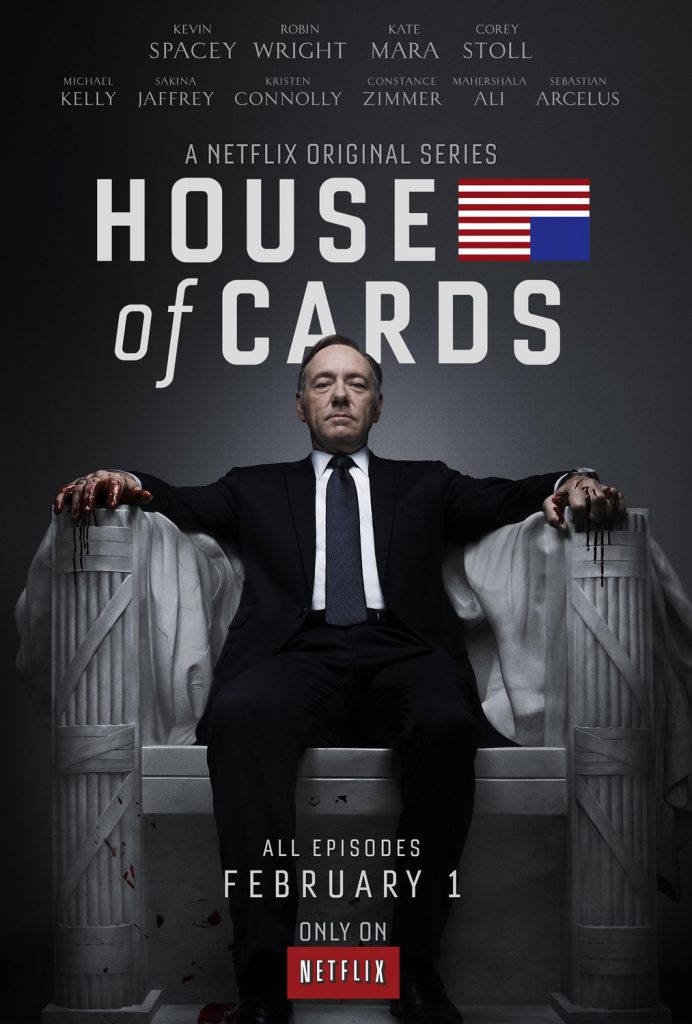‘House of Cards’: Who knew politics could be so enthralling?
By Matt McIlnay
Netflix had a lot to prove with House of Cards. As Netflix’s flagship original series, there was a lot riding on House of Cards becoming a success. To accomplish that end, they hired celebrated director David Fincher as executive producer, cast Kevin Spacey as the lead, and gave it a massive $100 million budget. The end result of all that money and talent is an extremely sophisticated political thriller that demonstrates that Netflix’s original series can indeed compete with and even surpass televised series.
Spacey plays Congress Majority Whip Francis Underwood, a man as ambitious as he is devious. Underwood has dedicated his entire life to slowly and methodically working his way up the political ladder without caring about who he steps on in the process. After being unceremoniously snubbed for a promotion to Secretary of State, a frustrated Underwood begins finding alternative and increasingly unsavory ways to maximize his political influence.
A large part of what makes House of Cards so compelling is just how terrible of a human being Francis is. His ruthless and extremely manipulative nature would make him the villain in any other story, but we’re invited to cheer him on in this series. He may be the exact sort of back-stabbing politician we all despise, but there’s an undeniable joy in watching someone with absolutely no ethical restraints scheme and double-cross his way out of an endless series of volatile situations.
What helps to establish a powerful rapport between Underwood and the viewer is an unusual but extremely effective storytelling device where he breaks the fourth wall and acknowledges the audience. He frequently turns to the camera and begins conversing with the viewer as if they were a trusted confidant. This relationship between Underwood and the viewer has the effect of making him much more likable and easy to connect with than he otherwise would have been.
Having such a magnetic protagonist is one part of why House of Cards is the perfect series for those who don’t usually like political dramas. Despite being focused on the often tedious subject of politics, the series’ complex narrative moves at a breezy pace and never loses steam. When combined with the stellar acting from the cast and some excellent character development, you have a winning formula that is likely to appeal to viewers who might otherwise groan at the idea of watching a series about politics.
Due to relatively low budgets and strict time limitations, most television series’ visuals pale in comparison to film cinematography, but that isn’t the case here. Executive producer David Fincher is renowned for gorgeous cinematography throughout his filmography, and House of Cards is no exception. Many of the shots are so polished and aesthetically pleasing that they look like they could have come from one of Fincher’s extravagantly budgeted films. His fondness for low key lighting and dark color tones is on full display here, so fans of his films will feel right at home.
Naturally, House of Cards has a few flaws. The characters are highly interesting to watch, but few of them are actually likable in any traditional sense, so you end up feeling little emotional attachment to anyone besides Francis. There’s also a few moments that stretch credibility, but it’s not enough to ruin your suspension of disbelief.
A few niggling flaws aside, Netflix hit a home run in almost every aspect with House of Cards. The cast is on top of their game, the writing is sharp and innovative, and the visuals are mesmerizing. The sheer level of quality on display here makes it a must-watch for serialized television fans, and will make it very appealing for those who aren’t normally drawn to political dramas. Those who haven’t seen it yet would be wise to give the first season a shot, especially since the second season starts streaming next month.



